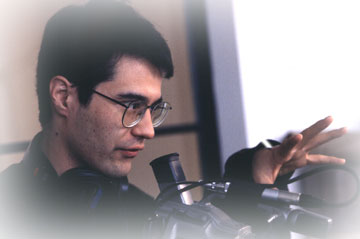|
ASIAN AMERICAN PERSONALITIES
|
CONTACT US
|
ADVERTISING INFO
© 1996-2013 Asian Media Group Inc
No part of the contents of this site may be reproduced without prior written permission.
GOLDSEA | ASIAMS.NET | ASIAN AMERICAN PERSONALITIES
Rhodes to
Rio Chino
PAGE 3 OF 3

GP: You bet. It's been great having Robot Stories out on the festival circuit at the same time as Eric Byler (Charlotte Soemtimes) and Justin Lin (Better Luck Tomorrow). And there are dozens, if not hundreds, of upcoming independent Asian American filmmakers. My friend Michael Kang just shot his first feature The Motel, which should set the world on fire next year. And filmmakers like Johanna Lee and Alice Liu are on the verge of getting their first features into production. Not to mention folks like Sam Chen and Ham Tran and Dean Yamada whose short films are winning awards right and left.
GS: Do you see Hollywood as becoming more open to Asian-themed projects?
GP: Well, there's a long tradition of Hollywood movies set in Asia -- starring white actors. Lost In Translation and The Last Samurai are the latest examples. The question is whether there's a better chance these days for stories starring Asian Americans to get off the ground. And I'm not yet sure. We've been getting great response to our Rio Chino screenplay but it remains to be seen where the money will come from -- that is, it remains to be seen whether Hollywood will pony up the cash or whether we'll end up digging up the money from other sources like private equity or foreign partners.
GS: Have you had much helpful contact or discussions with the Asian Americans who have established themselves in Hollywood?
GP: I've met with a number of Asian American executives over the years, and they've been uniformly supportive, which is great. While no real business has come from it yet, I think these are folks to whom I can go for advice and counsel and who may be helping to keep my name out there.
GS: What is the best way for a young person to get started in filmmaking?
GP: Writing, shooting, and editing shorts is the best way to figure out what filmmaking is all about and begin building and honing skills. And these days, it can be done incredibly cheaply, as long as you can get your hands on a video camera and computer. For much more on low budget filmmaking, I'd refer interested folks to my website FilmHelp.com.
GS: What impact did growing up in a multi-racial family have on your childhood?
GP: I grew up in a predominately white suburb of Dallas, Texas, and, like any non-white kid, had a certain number of infuriating encounters with racism over the years. What's interesting is that although I'm biracial, half Corean and half white, and my parents taught me that it was Eurasian and should be proud of that, I always knew I was first and foremost Asian -- that's the way I was defined by the social world in which I lived. It confuses people these days -- as I've grown, I've begun to look less stereotypically Asian -- since I've grown a beard, folks are more likely to yell “Bin Laden!” at me than “Ching Chong!”
CONTINUED BELOW
GS: What impact did growing up in a multi-racial family have on your perspective as a filmmaker?
GP: I'm sure growing up as a minority -- and as a biracial kid -- played a great role in my becoming a storyteller. I never got into fist fights as a kid -- I was always able to defuse trouble through talking or joking. It's very
possible that my interest in what makes people tick, in the human heart,
grew as a survival tactic -- I needed to understand people in order to learn
how to protect myself from potential embarrassment or persecution. And in
some ways, one of the goals of the storytelling I'm doing now is to defuse,
to make the world a little safer for different kinds of people by
normalizing the appearance of people of color on the big screen. What am I
getting at here... I think I'm saying that I learned that the best way to
protect myself was to find ways to personally connect with all kinds of
people. And now as a filmmaker, I'm still doing that, but the goal is to
find ways to make the characters I'm presenting connect with audiences of
all kinds.
GS: How did you come to be involved in Ann Richardson's gubernatorial
campaign?
GP: I studied political science as an undergrad and joined an organization
called Participation 2000 when I graduated in 1990. Part2 trained me to
work on political campaigns and then sent me to Texas to work on the Ann
Richards for Governor campaign. I was assigned as field coordinator for
38 counties in West Texas, the most conservative part of the
state. We lost all but one of my counties, but we won the election.
GS: What impact did three years in England have on your filmmaking perspective/style?
GP: That's tough to say... I don't know that you could say there's any
definable English influence on my filmmaking... But I can say that while I
was at Oxford, I saw a huge number of foreign films and met a number of
great directors, which was educational and eye opening. In particular, I
remember watching Kieslowski's Decaloge films on British television
several years before they were released in the United States.
GS: Tell us about your marital status/kids.
GP: Single, no kids.
GS: Do you have any interests outside of filmmaking?
GP: I've remained very interested in politics -- right now I'm following the
Democratic race for the presidential nomination with great interest. And I
sing a mean karaoke.
| “I'm sure growing up as a minority -- and as a biracial kid -- played a great role in my becoming a storyteller.” |
